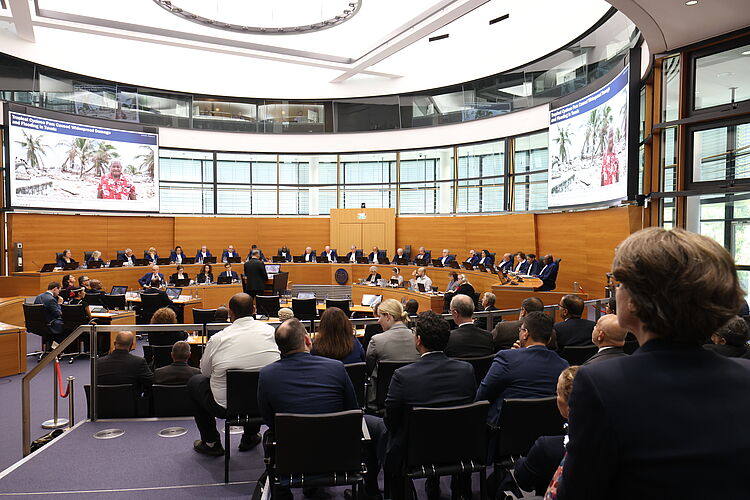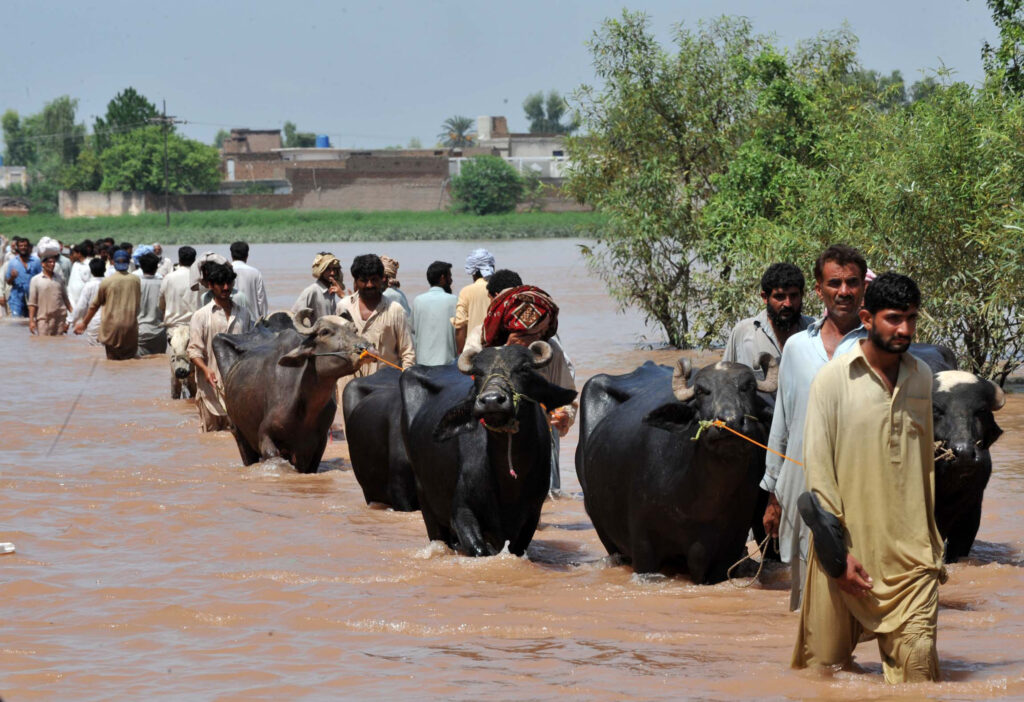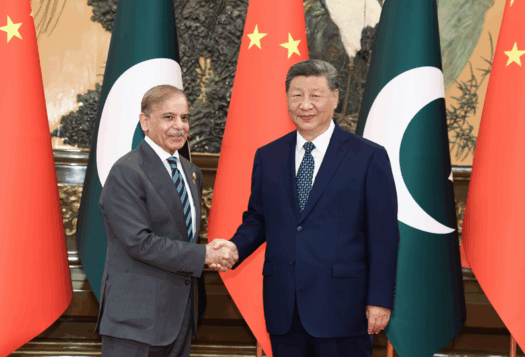
The Indus Delta, where the Indus River meets the Indian Ocean, supports critical fisheries and agriculture in the region. It is especially important for Pakistan’s economy and biodiversity. However, according to a recent study, the Indus Delta and the communities it supports are at severe risk of climate change-induced sea level rise. This growing threat underscores the importance of international legal frameworks on climate change, as well as the need for countries like Pakistan to actively engage with them.
On May 21, 2024, the International Tribunal for the Law of the Sea (ITLOS) issued a significant Advisory Opinion (AO)—it declared that states have an obligation to protect oceans from the impacts of climate change. This was a first of its kind as no international court or tribunal has previously issued an advisory opinion related to climate, nor has it addressed the issue of climate change in the context of UNCLOS. Despite Pakistan’s previous statements regarding the need for ocean governance pertaining to climate change, it chose not be involved in the AO proceedings. At a time when Pakistan is trying to highlight its vulnerability to climate change and take an active role in achieving climate justice, this absence is a missed opportunity to participate in international legal discourse pertaining to maritime governance.
What is ITLOS’ Advisory Opinion?
Following a request from the Commission of Small Island States on Climate Change and International Law (COSIS) at the end of 2022, ITLOS invited all state parties to the United Nations Convention on the Law of the Sea (UNCLOS) and other relevant international organizations to present written submissions in the case. Over 40 states and intergovernmental organizations, including the African Union and COSIS, made submissions for the proceedings. However, Pakistan, despite being a party to UNCLOS, did not participate. A state’s involvement in such proceedings signals its intent to shape the international legal discourse on these critical issues. Thus, a country like Pakistan, which has greatly suffered climate change impacts in recent years and whose recent activism on climate justice has caught international attention, was conspicuous by its absence.
At a time when Pakistan is trying to highlight its vulnerability to climate change and take an active role in achieving climate justice, this absence is a missed opportunity to participate in international legal discourse pertaining to maritime governance.
The AO addressed several key questions in the context of climate change and maritime pollution. It established that greenhouse gasses (GHG) absorbed by the oceans constitute marine pollution as defined by Article 1.1.4 of the UNCLOS. The AO also addressed the responsibilities of states under Article 194 of the UNCLOS, which requires states to take all necessary measures to prevent, reduce, and control marine pollution from any source. In doing so, it emphasized that Article 194 requires states to prevent, reduce, and control GHG absorbed by the oceans, and do stringent due diligence to mitigate the harmful impacts of climate change on the marine environment. While AOs are not legally binding, they play an important role in the future development of international law by providing authoritative interpretations of legal documents and guiding state practice.
South Asian Climate Leadership Sans Pakistan
Despite its eligibility, Pakistan did not participate in the AO proceedings. This is surprising because just a few days before the Tribunal invited state parties to participate, Rabia Ijaz, the Second Secretary of Pakistan’s Permanent Mission at the United Nations, spoke about Pakistan’s commitment to the conservation and sustainable use of oceans. Ijaz also emphasized the dangers faced by marine ecosystems and commented on the role of bodies like ITLOS in managing the world’s oceans.
In contrast, both Bangladesh and India chose to participate, clarifying their positions on the issue and actively shaping the discourse on matters that impact their interests. Bangladesh’s submission went into detail about the country’s vulnerability to climate change and the impact of rising sea levels on the population and marine ecosystems in the Ganges Delta. Based on these concerns, Bangladesh argued that UNCLOS enforces an obligation on states to protect and preserve marine environments. Considering that the Pakistani government regularly highlights its vulnerability to the impacts of climate change, as well as the similarity of challenges faced by the Ganges Delta and the Indus Delta, it can be argued that the country missed an opportunity to further stress the challenge it faces due to climate change and bring global attention to it.
Unlike Bangladesh, India challenged the Tribunal’s jurisdiction to give an AO on the matter, arguing that the Rules of Procedures of the Tribunal do not empower it to “confer new jurisdiction.” India’s submission emphasized that UNCLOS’ provisions on protecting the environment do not create a responsibility to reduce and control pollution that “results or is likely to result from climate change.” Moreover, India argued that there is no responsibility on states to “protect and preserve the marine environment in relation to climate change impacts.” India’s submission to the AO is consistent with its stance in other international fora where it has opposed text pertaining to reduction in emissions and climate change mitigation. India’s stance is based on the principle of common but differentiated responsibilities and respective capabilities whereby it argues that developed countries should take greater responsibility for historical emissions and provide support to developing countries. This position, however, has been challenged by the Alliance of Small Island States (AOSIS), which questions the classification of China and India as developing countries, given that they are the largest and third largest global emitters of greenhouse gasses respectively.
What Explains Pakistan’s Absence?
Pakistan’s absence stems from a lack of political will as well as institutional capacity to prioritize engagement with international legal regimes. This indifference is evident in the delay with which Pakistan passed the Pakistan Maritime Zones Act 2023.
The Pakistan Maritime Zones Act consolidates domestic and international law related to the territorial sea and maritime zones of the country. The Act aims to enable Pakistan to assert its rights, jurisdiction, and sovereignty in a way that aligns with its international commitments. However, it took Pakistan 27 years after it ratified UNCLOS in February 1997 to pass a law on maritime zones. While Pakistan is not alone in moving slowly when it comes to incorporating international treaties into domestic laws, this delay on such a crucial matter indicates Pakistan’s reluctance or inability to prioritize maritime governance.
Further evidence of Pakistan’s lack of active engagement with international regimes is its failure to sign the High Seas Treaty, despite actively participating in and welcoming its recent adoption. This contrasts with other regional countries like India, Bangladesh, Maldives, Nepal and China, who have already signed the treaty.
By not participating in the ITLOS proceedings on climate change, Pakistan missed a vital opportunity to influence the global legal frameworks that will shape the future of maritime regulation. While not binding, the advisory opinion contributes to the development of international customs that could later become enforceable law. Pakistan’s non-involvement weakens its ability to protect its critical maritime interests, including coastal sovereignty, fisheries, and marine resources, and diminishes its standing in a region where maritime issues are increasingly linked to national security and economic growth.

This disengagement from ocean governance is part of Pakistan’s broader pattern of inaction on the development of international law. As other regional actors like Bangladesh and India assert their positions in global legal fora, Pakistan risks isolating itself from critical discussions that will influence future regulatory landscapes. Without active participation, Pakistan may face obligations imposed by international bodies that do not align with its domestic priorities or capabilities.
The Way Forward for Pakistan
Moving forward, stakeholders in Pakistan should prioritize engagement with international legal frameworks. Doing so will require investing in Pakistan’s institutional capacity for ocean governance. One way of doing this could be by developing specialized training programs for diplomats, public policy practitioners, and other relevant stakeholders, similar to those employed by the Philippines, Indonesia, or South Africa. These programs should focus on developing capacity in core tenets of international law of the sea and horizon scanning to identify issues that are important for Pakistan’s maritime interests. Undertaking these initiatives could significantly enhance Pakistan’s presence and negotiation skills in global fora.
While not binding, the advisory opinion contributes to the development of international customs that could later become enforceable law. Pakistan’s non-involvement weakens its ability to protect its critical maritime interests.
If Pakistan does not recalibrate its approach, it risks being sidelined in the evolving geopolitics of the Indo Pacific, where ocean governance is increasingly critical for both environmental sustainability and national security. Proactive engagement offers Pakistan a unique opportunity to influence the formation of international norms and effectively tackle pressing challenges related to marine pollution and climate change, particularly as it faces severe risks from these threats. Embracing these strategies will secure Pakistan’s maritime sovereignty and enable it to contribute meaningfully to regional stability and prosperity.
Also Read: Integrating Climate Diplomacy and Water Management in South Asia
***
Image 1: International Tribunal for the Law of the Sea
Image 2: Abdul Majeed Goraya / IRIN via Flickr


